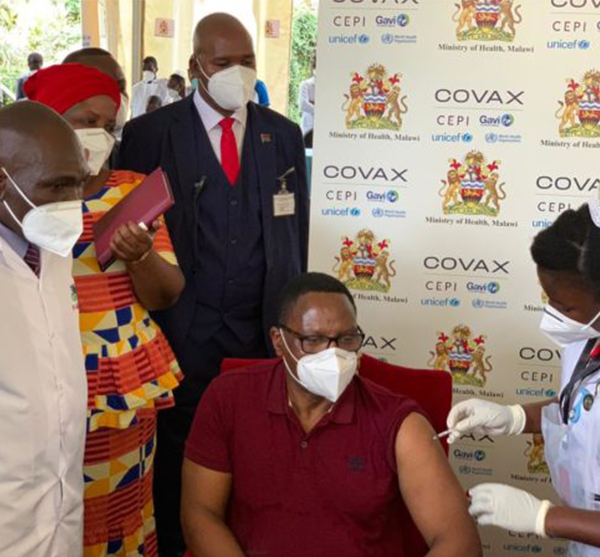VACCINE STATUS IN MALAWI
Malawi received COVID-19 vaccine doses shipped via the COVAX Facility, a partnership between CEPI, Gavi, UNICEF and WHO. This is a historic step towards the goal of COVAX to ensure equitable distribution of COVID-19 vaccines globally, in what will be the largest vaccine procurement and supply operation in history. The delivery is part of a first wave of arrivals in Africa, and the first tranche of allocations for Malawi that will take place in the coming months and year through the COVAX Facility.
The COVAX Facility shipped 360,000 doses of the Oxford-AstraZeneca vaccine from Serum Institute of India from Mumbai, India, to Lilongwe, Malawi, arriving on the evening of 5 March. The arrival in Lilongwe marks a milestone for Malawi in the fight against the COVID-19 pandemic which has claimed over 1000 lives and created a heavy burden on health facilities.
The Government of the Republic of Malawi has also received 360,000 bundled syringes and 3,625 safety boxes for safe disposal of syringes for COVID 19 vaccination through the COVAX Facility. An additional 2.1 million and 21,600 safety boxes have been dispatched by sea for Malawi arriving mid-March.
The Government of the Republic of Malawi has identified priority groups who will be among the first to receive the COVID-19 vaccine. These include health care workers, including those working in the private sector, who are at higher risk of COVID 19 infection than the general population due to the nature of their work, and more likely to be affected by COVID-19. Also included in phase one are police, immigration, Malawi Defence Force, prison warders, prisoners, teachers, those 60 years and above, and people with underlying conditions. His Excellency the president of the republic of Malawi, Dr Lazarus McCarthy Chakwera Launched the distribution of Vaccine in Malawi on 11th March 2021 in Zomba City.
Benefits of Covid-19 Vaccine, Why getting a Jab??
The COVID-19 vaccines produce protection against the disease, as a result of developing an immune response to the SARS-Cov-2 virus. Developing immunity through vaccination means there is a reduced risk of developing the illness and its consequences. This immunity helps you fight the virus if exposed. Getting vaccinated may also protect people around you, because if you are protected from getting infected and from disease, you are less likely to infect someone else. This is particularly important to protect people at increased risk for severe illness from COVID-19, such as healthcare providers, older or elderly adults, and people with other medical conditions.
Will Covid-19 vaccines provide long term protection?
Because COVID vaccines have only been developed in the past months, it’s too early to know the duration of protection of COVID-19 vaccines. Research is ongoing to answer this question. However, it’s encouraging that available data suggest that most people who recover from COVID-19 develop an immune response that provides at least some period of protection against reinfection – although we’re still learning how strong this protection is, and how long it lasts. – WHO
How quickly could Covid -19 Vaccines stop the pandemic?
The impact of COVID-19 vaccines on the pandemic will depend on several factors. These include the effectiveness of the vaccines; how quickly they are approved, manufactured, and delivered; the possible development of other variants and how many people get vaccinated Whilst trials have shown several COVID-19 vaccines to have high levels of efficacy, like all other vaccines, COVID-19 vaccines will not be 100% effective. WHO is working to help ensure that approved vaccines are as effective as possible, so they can have the greatest impact on the Pandemic.
Let’s continue to follow precautionary measures
Safe and effective vaccines will be a game-changer: but for the foreseeable future we must continue wearing masks, physically distancing and avoiding crowds. Being vaccinated does not mean that we can throw caution to the wind and put ourselves and others at risk, particularly because it is still not clear the degree to which the vaccines can protect not only against disease but also against infection and transmission.

